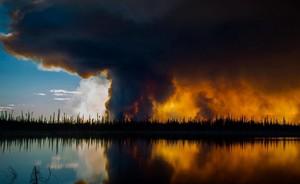WildfiresThe origins of Tennessee’s recent wildfires
Wildfires raged recently through the foothills of Tennessee’s Great Smoky Mountains, fueled by severe drought and high winds in the eastern part of the state. The fires damaged or destroyed more than 1,400 structures, including homes, chapels, and resort cabins. Fourteen people were killed, and nearly 150 others were injured. Last week, two juveniles were taken into custody and charged with aggravated arson in connection with the deadly wildfires – but sources such as Climate Central suggested that rising temperatures may have played a role in the fires. Does climate change play a role in determining the frequency and intensity of wildfires?

Raging wildfires have brought unexpected damage to Tennessee // Source: theconversation.com
Wildfires raged recently through the foothills of Tennessee’s Great Smoky Mountains, fueled by severe drought and high winds in the eastern part of the state. The fires damaged or destroyed more than 1,400 structures, including homes, chapels, and resort cabins. Fourteen people were killed, and nearly 150 others were injured. The New York Times reported that more than 14,000 people fled Gatlinburg alone. Last week, two juveniles were taken into custody and charged with aggravated arson in connection with the deadly wildfires, according to the Tennessee Bureau of Investigation.
Sources such as Climate Central suggested that rising temperatures may have played a role in the fires. News@Northeasetrn asked Northeastern’s Auroop Ganguly, an expert on climate extremes and water sustainability in the Department of Civil and Environmental Engineeering, about the possible relationship between climate change and severe events such as wildfires. Ganguly, who worked as a scientist at the Oak Ridge National Laboratory in East Tennessee for seven years before coming to Northeastern, provided insight into the many factors that may have contributed to the blaze.
Why do you think that many people immediately point to climate change when they hear about increased instances of wildfires?
Extreme weather and hydrological events — including heat waves and heavy rain and perhaps floods, drought, and hurricanes — are precisely what so-called “global weirding” is expected to produce under global climate and regional land-use changes. Such events are projected to become unprecedented in scale. Climate scientists have long said that wildfires are among the extreme events that climate change may enable. Indeed, various news reports quoted Tennessee Gov. Bill Haslam as saying, “This is the largest fire in the last hundred years of the state of Tennessee.”
From the perspective of human psychology, it is natural to try to find a causal link, even among completely unrelated events or chance occurrences. The ability to explain frightening events helps us feel as if we have some control over them, even when, in reality, we don’t. When there has been forewarning, as there has been regarding the possible repercussions of climate change, those explanations become even more credible.
This is not to say that climate change didn’t play a role in the fires in Gatlinburg. But we want to be careful. The chain of causality is not always direct or linear, or even easy to follow.
You mentioned chain of causality.
